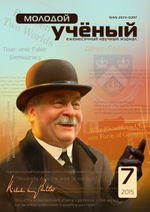This article focuses on the period XII — XIV centuries which is characterized by the French influence on the English lexical fund due to the Norman Conquest. The detailed analysis of the Oxford Dictionary of Foreign Words and Phrases provided us the percentages of French loanwords in English.
Keywords:loanword, lexical borrowing, national language, language contact.
The rapid growth of Anglicisms and Americanisms is resulted from the amplifying introduction of American culture. Nevertheless, the English language has not always been in a privileged position. Until the XIX century French was in the lead, it considerably enriched the lexicon of numerous languages.
Collins Dictionary & Thesaurus provides the following definition of “loanword”: A word adopted from a foreign language with little or no modification [1, p.162].
A loanword (or lexical borrowing) is the linguistic phenomenon caused by extra-linguistic factors. In fact, the transformations’ reasons in a language are often related to its history. The quantity of loanwords is connected with the historical events and with language contacts. The economic, political and cultural prestige of a country plays a paramount role for the presence of lexical borrowings from the language.
The period XI — XIV centuries is crucial for the English vocabulary. This phenomenon is historically associated with the Norman Conquest when William I the Conqueror gained the victory over the English troops in 1066 and invaded the country.
The culture of the Normans was French. The new regime was headed by the French-speaking elite, the focus of whose world was the European mainland, where they continued to hold land.

Fig. 1: The Norman Conquest
The spreading of French words did not begin hereupon the Norman Conquest but only in the XII century. The items penetrated mainly into the spheres related to the state administration, judicial system, military institution, liturgy, culture and the elite’s mode of life.
French loanwords of the XII –XIII centuries appeared from the Norman dialect, one of the northern dialects in Old French. In England this dialect is granted the status of the state language.
French used to be the official language of the court and clerical work. The national language had not formed yet, that led to the reinforcement of French. Moreover, language contact is characterized as significantly long. Hence English was “saturated” with French words.
The overwhelming majority of French words included in the list of lexical borrowings of Middle English, fixed in the national language.
Frequently, a French word forced completely out an English term (for example, fr. beauté (beauty) ousted OE. wlite) or made synonyms (fr. large supplemented eng. big).
Loanwords of French origin were subjected to the phonetic assimilation, therefore English terms lost typical stress on the last syllable.
Furthermore, English spelling was under the French influence. The composition and the copying of documents turned out to be under the authority of Normans chroniclers who inserted a correction in the text, introducing familiar symbols. Consequently, such denotations like th, gh, sh, ch, tch, dg,j appeared in the graphic system of English.
Besides, French had an impact on the word-formation. The percentage of French suffixes (35 %) exceeds the native ones (30 %) [2, p.17]. For instance, such suffixes like ance/ence, ment, age, al, ard, ess, able/ible, let, ee, ish appeared.
The XV century is the period of the national language’s formation. In the second half of the XIV century, the triumph of English was perfectly obvious: French was losing its prestige. However, it does not mean that French is deprived of authority. Indeed, language contacts occur till nowadays.
Empirical evidences suggest that dictionaries represent the fundamental linguistic document, so we applied the lexicographic aspect for analysis of French items as part of English vocabulary.
We have studied the second edition of the Oxford Dictionary of Foreign Words and Phrases (by Andrew Delahunty), which contains more than 6000 loanwords from 40 languages of the world. The dictionary clearly reveals the mutual influences on the vocabulary formation. The Oxford dictionary details the use of each word or phrase providing them with quotes. A list of loanwords, according to their origins, is situated in the appendix. That simplifies the research of French lexemes which are in an alphabetical order.
The information throughout is derived from Oxford’s unique dictionary resources and based on analysis of the two-billion-word Oxford Corpus which monitors the English language as it used today.
Several terms from the first edition were omitted due to the fact that they are considered as completely assimilated. The dictionary of 2008 is filled with some new lexical borrowings.
The Oxford Dictionary of Foreign Words and Phrases has been revised throughout. We have revealed 1765 items of French origin, thereafter 29.4 % of all loanwords. For the indicated period (XI — XIV centuries) we have found only 103 words (5.8 %). It allows us to draw a conclusion that several items became obsolete and passed out of use.
Thus, 300 years of French domination affected noticeably the English lexicon. The presence of a large amount of French words confirms its undeniable superiority.
References:
1. Collins Dictionary & Thesaurus / ed. Gilmour L. — Glasgow: HarperCollins Publishers, 2013. — 313 p.
2. Володарская Э. Ф. Заимствование как универсальное лингвистическое явление / Э. Ф. Володарская // Вопросы филологии. — 2001. — № 1 (7). — С. 11–27.
3. The Oxford Dictionary of foreign words and phrases / ed. by Delahunty A. — Oxford: Oxford University Press, 2008. — 408 p.
4. Thody P. Le Franglais: Forbidden English, forbidden American: law, politics and language in contemporary France: a study in loanwords and National Identity. — London: Athlone, 1995. — 300 p.







